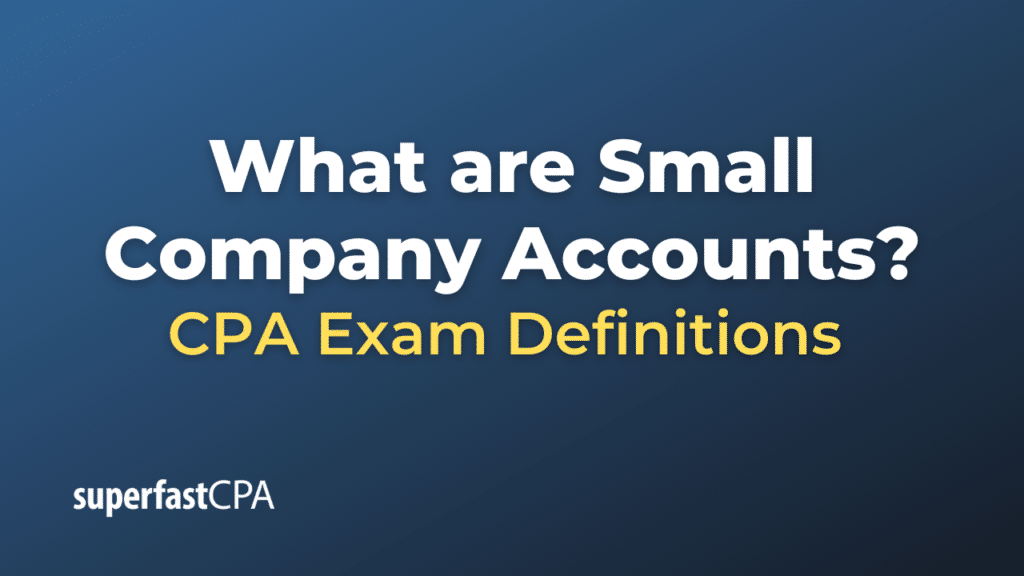Small Company Accounts
“Small Company Accounts” refer to a type of financial statement that is abbreviated and provides less detailed information than full financial statements. This streamlined format is often permitted for qualifying small companies in various jurisdictions. The intention behind allowing small company accounts is to reduce the administrative burden on smaller businesses.
The criteria for what constitutes a “small company” can vary from one country to another. Generally, a company must meet certain thresholds related to turnover, balance sheet total, and the number of employees.
Features of Small Company Accounts:
- Reduced Disclosure: Small company accounts typically require less detailed information than full accounts. This might mean fewer notes or simplified presentation formats.
- Balance Sheet: The balance sheet might be abbreviated, showing only aggregated categories.
- Profit and Loss account: The profit and loss account might be shorter and may not require a detailed breakdown of costs and revenues.
- Exemptions: Depending on the jurisdiction, small companies may be exempt from certain disclosures, like cash flow statements or detailed notes on transactions with directors.
- Audit Requirements: In some jurisdictions, small companies might be exempt from mandatory audits, though they still need to ensure that their accounts provide a true and fair view of their financial position.
Criteria: The specific criteria defining a “small company” can vary. For instance, in the UK, under the Companies Act 2006, a company qualifies as “small” if it meets at least two of the following conditions:
- Its turnover does not exceed £10.2 million.
- Its balance sheet total does not exceed £5.1 million.
- It has no more than 50 employees on average.
It’s crucial for companies to check their local regulations to understand the exact criteria and the implications of qualifying as a small company.
Benefits of Small Company Accounts:
- Reduced Administrative Burden: With fewer details to provide, the process of preparing financial statements can be quicker and less costly.
- Confidentiality: By providing less detail, small companies can maintain greater confidentiality about their financial operations.
- Cost Savings : Less detailed accounts might lead to cost savings, especially if the company is exempt from an audit.
However, while there are advantages to using small company accounts, it’s essential for business owners to remember their responsibility to provide accurate financial statements that do not mislead users. The accounts should still give a clear and true view of the company’s financial position and performance.
Example of Small Company Accounts
Let’s imagine a small company named “GreenLeaf Teas” in the UK. They’re a business that sources and sells organic teas.
Yearly Financials:
- Turnover: £8 million
- Balance sheet total: £4 million
- Average number of employees: 40
Based on the UK’s Companies Act 2006 criteria, “GreenLeaf Teas” qualifies as a small company since they meet all three conditions.
Now, if they were to prepare Small Company Accounts:
1. Abbreviated Balance Sheet:
| Particulars | Amount (£) |
|---|---|
| Fixed Assets | 2 million |
| Current Assets | 2.5 million |
| Current Liabilities | (0.3 million) |
| Net Assets | 4.2 million |
| Capital & Reserves | 4.2 million |
(Note: This is a very basic format, and the real balance sheet might have more lines even in an abbreviated form.)
2. Simplified Profit and Loss:
| Particulars | Amount (£) |
|---|---|
| Turnover | 8 million |
| Cost of Sales | (5 million) |
| Gross Profit | 3 million |
| Operating Expenses | (2 million) |
| Net Profit | 1 million |
3. Exemptions:
- GreenLeaf Teas” might choose not to prepare a detailed cash flow statement.
- They might also opt not to provide detailed notes on certain transactions if the law exempts them.
4. Audit: Given its status, “GreenLeaf Teas” might be exempt from a mandatory audit, resulting in savings on audit fees.
This example gives a basic view of what small company accounts might look like. It’s essential to understand that the exact format, content, and exemptions will depend on local regulations and standards.













